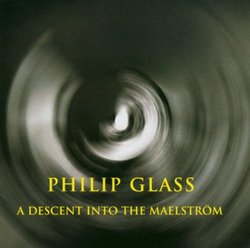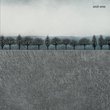| All Artists: Philip Glass; Philip Glass Ensemble Title: Philip Glass : A Descent into the Maelstrom Members Wishing: 3 Total Copies: 0 Label: Orange Mountain Original Release Date: 7/19/2002 Release Date: 7/19/2002 Album Type: Import Genre: Classical Styles: Chamber Music, Historical Periods, Classical (c.1770-1830), Modern, 20th, & 21st Century Number of Discs: 1 SwapaCD Credits: 1 UPC: 801837000528 |
Search - Philip Glass; Philip Glass Ensemble :: Philip Glass : A Descent into the Maelstrom
 | Philip Glass; Philip Glass Ensemble Philip Glass : A Descent into the Maelstrom Genre: Classical
In continuing with their ongoing program of releasing vital recordings from the archive of Philip Glass recorded material, Orange Mountain Music is pleased to release "A Descent into the Maelström". In 1986 Mr. Glass ... more » |
Larger Image |
CD DetailsSynopsis
Album Description In continuing with their ongoing program of releasing vital recordings from the archive of Philip Glass recorded material, Orange Mountain Music is pleased to release "A Descent into the Maelström". In 1986 Mr. Glass was commissioned to create and bring a piece to the Adelaide Festival of Arts in Adelaide, Australia. He chose to write a piece based on the Edgar Allan Poe short story "A Descent into the Maelström" and invited collaborators dancer/choreographer Molissa Fenley, set designer Eamon D?Arcy and theatre director Mathew McGuire to participate. They transformed Edgar Allan Poe's vertiginous short story of being swept into a huge and terrible whirlpool by a raging hurricane that "the oldest seaman in Norway never experienced" into a Musical/Dance/Theatre extravganza. This compelling, propulsive piece of music premiered in March, 1986 at the Adelaide Festival of Arts and was only performed by the Philip Glass Ensemble during the week of the festival in Australia. Consequently, it has had very little exposure to Philip Glass' audience. In the spring of 1986 after the Ensemble returned to New York it was discovered that the 24 track live recordings that were made of the performances were distorted, noisy and mostly unusable. At that point PGE musical director, Michael Riesman, Kurt Munkacsi and the Ensemble members set about replacing their parts on the recording. The newly recorded tracks had to be kept in sync with the live recording because the resulting mix would be used for a television broadcast of the performances. The finished recording is a studio/live hybrid. It is very similar to the mix that was made in 1986 for the video, but we've remixed the material taking advantage of the digital recording technology that is available today! . This little known recording of this powerful piece of classic Glass music was made when the Philip Glass Ensemble was at one of its peaks. It was also done in possibly one of the best settings for Philip Glass and his musicians? musical theatre. It will be available for shipping July 19th, 2002 Similar CDs
|
CD Reviews1,000 Airplanes meets The Photographer Gary Schroeder | 10/05/2002 (4 out of 5 stars) "Having nearly every CD that Glass has ever released, it's difficult for me to objectively evaluate this disc. On one hand, it's pleasant that the style is so familiar, but that's also it's main drawback. There's nothing extremely unique about this piece. I would describe it as an almost perfect synthesis between "1,000 Airplanes on the Roof" and "The Photographer", both written around the same time. If you liked these two discs, you'll probably enjoy Maelstrom, tracks from which could easily appear on either one of them, fitting in seamlessly." OOPS! ORANGE MOUNTAIN MUSIC HAS DONE IT AGAIN!!!! Gary Schroeder | 09/03/2002 (5 out of 5 stars) "In my amazon.com review (just a few months ago) for EARLY VOICE, the previous Orange Mountain Music Philip Glass release, I declared it the most important CD of the year, anywhere. Well, I stand corrected as this new release, A DESCENT INTO THE MAELSTROM, is yet another "MOST IMPORTANT CD OF THE YEAR"! OMM has delivered the Glass goods yet again- two CD's which are the most important releases of the year- I challenge anyone to show me more significant releases anywhere.MAELSTROM is a little-known (until now) masterwork by legendary composer Philip Glass, written way back in 1986 for, and performed by, his own Philip Glass Ensemble. Why this work was "forgotten" will always be a mystery to me- it's truly a masterpiece. Forgetting about this piece would be like forgetting about Beethoven's Symphony No. 9. As far as works which touch the soul, excite, and inspire, I'd put this work against any other. This high-flying, boisterous, propulsive, compulsive, obsessive, intense, and romantic work is simply amazing- brought to life here on CD through this brilliant recording. 65 minutes of pure Glass! I've been a Glass fan since around 1982- nobody else compares. Glass has written many masterpieces, but this work turns out to be my favorite of all. That is saying a lot, as I never thought I would settle on an absolute favorite Glass piece- there are so many to consider!Trying to put the music of MAELSTROM into words is really an almost impossible task. It's a 65 minute, non-stop work, made up of what I would call 6 to 8 minute sections, even though the CD is divided further into 18 tracks. Each major section is pretty much a work in itself. After a rousing introduction in Track 1 "Vertigo", the real rousing intro is actually Track 3, "Engagement"! Special note is given to the angelic solo soprano vocals by Dora Ohrenstein, especially at 3:42 of Track 3- simply magic- such an incredibly beautiful theme!Track 9, "The Hurricane and Recognition of Death", kicks serious ...!Track 13, "Abandonment", is an amazing respite from the intensity of the rest of the piece- it's romantic and dreamy, once again with beautiful vocals by Dora Ohrenstein.I just can't get enough of this piece- it truly is the best piece of music I've ever known. I listen to MAELSTROM every night before I call it a day. Some people have commented that Glass's music is often dark- it doesn't strike me that way at all. It's very bright to me- it's almost like Glass has converted protons of light into sound.Track 16, "Second Perception of Light, Moon, Mist, and Rainbow" is so clever, cute, wondrous, and joyous! It never fails to bring a smile to my face! Track 17, "The Maesltrom" is the "finale" to this mega-masterpiece. The bass line throughout is ingenious! This section is equivalent to being in the middle of a hurricane. It is among the most intense music that Glass has composed. I find this section to be a spiritual experience (a common occurrence when listening to Glass). It's exactly like being in the eye of a hurricane- all of this frantic craziness is going on all around you, but where you're located, things are actually calm. The "noise" of Glass's music, combined with its perfect clarity of structure, clears out my thinking. Track 17 is the most affirming and inspiring piece of music I've ever heard! I hope you have an excellent stereo or this CD will eat your system alive. This recording is a revelation. You never hear music like this on the radio or on TV- nobody else writes music like this. Glass is truly a musical Superman.I could go on all day about this CD; I'll just have to say that MAELSTROM is a mega-masterpiece by Philip Glass. I can't recommend this CD more highly. Thanks to Kurt Munkacsi for his ingenious sound design; Don Christensen and Michael Riesman for the amazing job bringing this CD to life with the latest digital technology, and of course, thanks to Philip Glass for starting OMM and composing the GREATEST music in the world." Been waiting for this one. EMV | 08/23/2002 (5 out of 5 stars) "It's finally here. The full recording of a piece I have heard the Philip Glass Ensemble play an excerpt from many times. I have been waiting for this recording since the mid-eighties. It was always one of my favorite pieces to listen to the ensemble play. The catch is that I have not heard the full cd yet. I can tell you from the free excerpts available on the Amazon.com site that I will not be disappointed when I get the full recording. One of the things setting "Descent" apart from some other Glass works is a tenor saxophone jazz improvisation. I'm not kidding. It's very cool. I am hearing synthesizers here as well, which the Ensemble always made large use of when performing live. It reminds me of "1,000 Airplanes on the Roof", another remarkable Glass work. Very happy this has finally been released."
|

 Track Listings (18) - Disc #1
Track Listings (18) - Disc #1


